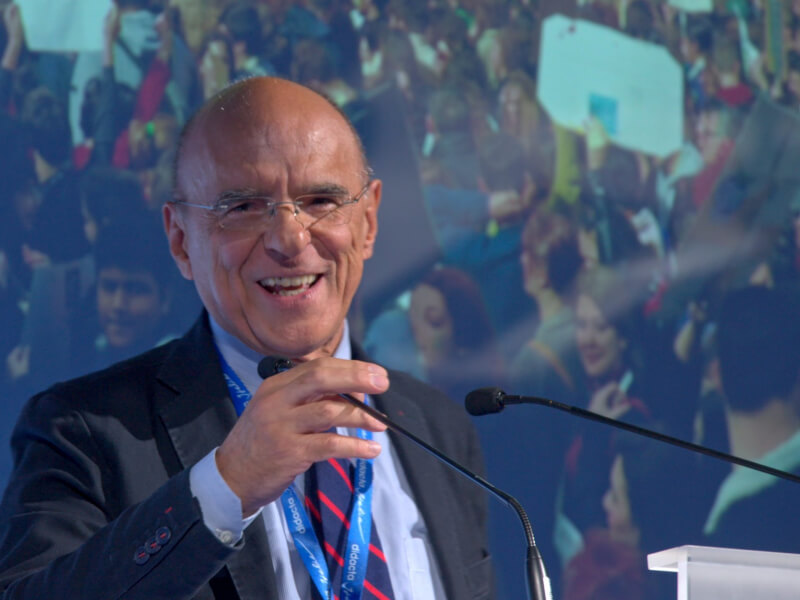18 November 2022 – We are often not as conscious as we should be about the power of the words we use in everyday language. We also use words that have become common parlance with little attention to the possible meanings they may convey in diverse contexts. We are part of a small subset of the global population that often purports to speak on behalf of humanity, without necessarily paying attention to the blind spots we reflect.
In the Emerging New Civilisations Initiative (ENCI) of The Club of Rome, we have become much more sensitive to our own blind spots in the many engagements with people at various levels of human society across geographies of our world. We are often reminded to be a lot more alert to the reality that English is the lingua franca of elites, who are a minority segment of the total human population in the world. English is not a lingua franca of the world. Our engagements with human beings from a diversity of contexts have raised our levels of consciousness about the power of language, and the unsaid meaning of words.
I would like to simply list and comment a little on the common pitfalls we should be mindful of:
- Universal is often thrown in to assert claims that a statement made expresses a commonly held point of view. When one is asked why we think, so we become defensive. What is said to be universal is not necessarily regarded as such by most people in the world who may have an entirely contrary view. This was brought home to us as members of the Club of Rome Africa Region as we were preparing the paper, New Narratives of Hope in 2020. A common example is the view of “family”, which in much of the Western world is about the nuclear family, whereas for most people in the world, including Africa, family consciously includes extended members – siblings and their children and children’s children! Pluriversal is a more appropriate word to reflect our consciousness of diversity and plurality of views points. We need to embrace pluriversality to enrich our understanding of what it means to be human and to signal our sensitivity to the views of others as members of one human race.
- Developed/Developing – What are the assumptions underlying what it means to be regarded as ‘Developed versus Developing’? Western countries have coined these terms using their dominance of International Development Finance Institutions such as the International Monetary fund (IMF)/ World Bank (WB) to embed a certain hierarchy in development speak. Does it mean that being income-poor is a marker of not being developed? Or how is one to be measured as being in the process of developing? What is the standard of development that is acceptable to humanity to declare completion of the development process? Carlos Álvarez Pereira, vice president of the Club of Rome, Club of Rome, draws our attention to the need to ask the question: what is the shift we need to move fast towards human societies where High Well-being @ Low Footprint is achieved in an equitable manner? In practical terms, this means that we must pursue two different paths of evolution, depending on the starting point of each country or community: i.e., Higher Well-being @ Low Footprint or Lower Footprint @ High Well-being. No country can be said to have arrived at development if we embrace this way of thinking. We all have to strive for well-being for all for a healthy planet from where we are. Sustainable Development Goals (SDGs), as standard bearers of development in the UN context, are not adequate for the task of helping us as a global human family to achieve the equity essential to well-being for all for a healthy planet. The assumptions embedded in the SDGs is that low-income countries have to play catch up with high-income countries which continue to merrily consume at unsustainable levels that make global equity unattainable.
- First and Third worlds. What are the assumptions behind labelling one set of countries First and others Third? If one were to use scientific records of how our world evolved, Africa is a now undisputed Cradle of humanity. It is also the place where the first human civilisation is memorialised by archaeological artefacts as well as the towering Pyramids of Egypt and Nubia. What is the basis on which the definition of dominant economic powers as constituting the First World? Do these designations not reflect a certain arrogance from regions that extracted the wealth of now poor countries designated as Third World countries by those basking in the glory of being First World? Take the example of Haiti, a tiny island that was forced into paying reparations for daring to free themselves from slavery and colonial rule by France! The extraordinary imposition on a people to repay their slave masters for the temerity of daring to free themselves continues to reverberate in the grinding poverty and chaos in governance in Haiti. How can we build a global equitable human community without attending to such historical wounds that are unlikely to heal without acknowledgement?
- Rest of the World versus Most of the World quantitative measures used in many institutions, including by respectable scholars, often focus on statistics of Consumption, Population Profiles, Educational Attainment etc. in Western countries, are often accompanied by throw-away references to the ‘rest of the world.’ The irony is that dominant Western countries represent just over 15% of the world population, whilst the ‘rest of the world’ includes Asia, which alone represents 60% of the world population, followed by Africa with 17.5%. The “Rest of the World” reference cannot, therefore, be referring to the numbers of people but suggests something else – a residual category after dominant regions have been dealt with.
- International is another word that is a code word for Western countries of Europe and the USA. This is particularly prevalent among those working in institutions based in powerful western institutions. Research that is done in those dominant areas is deemed to be international, whereas work done in countries in large regions of Asia and Africa is seen as local or peculiar to those areas. This is the mother of blind spots in scholars and public servants who should know better.
- The Poor is a common expression among development workers, opinion makers and influencers, including scholars. People are poor, but that does not define their humanity. Human beings have inherent dignity that cannot be undervalued by the poverty that has befallen them due to the structural inequalities of our current global socio-economic system. The designation of people as ‘the poor’ submerges their identity as human beings in an economic status, not of their choosing. Indian economist C T Kurien reminds us that poverty is the carcass left after wealth acquisition. The biggest problem of our world today is not people who are poor but the nature of wealth acquisition that generates poverty and our normalisation of these inequitable relationships. Without tackling the systems that generate wealth for very few at the expense of many people, talk of poverty alleviation or reduction is symptomatic treatment. Uprooting poverty can only be done by eradicating the deadly disease of extractive economic relationships that continue to undermine the well-being of all and threaten our biosphere.
- Global Equity versus Growing Private Equity for the few at the expense of the many. Global equity is about promoting the Common Good to be enjoyed by all equally in relationships of trust generated by human-to-human conversations that co-create shared goals and purposes. Imagine a world in which the pursuit of growing global equity shifts the mindsets of those preoccupied with their own ‘private equity’ often at the expense of the Common Good!






